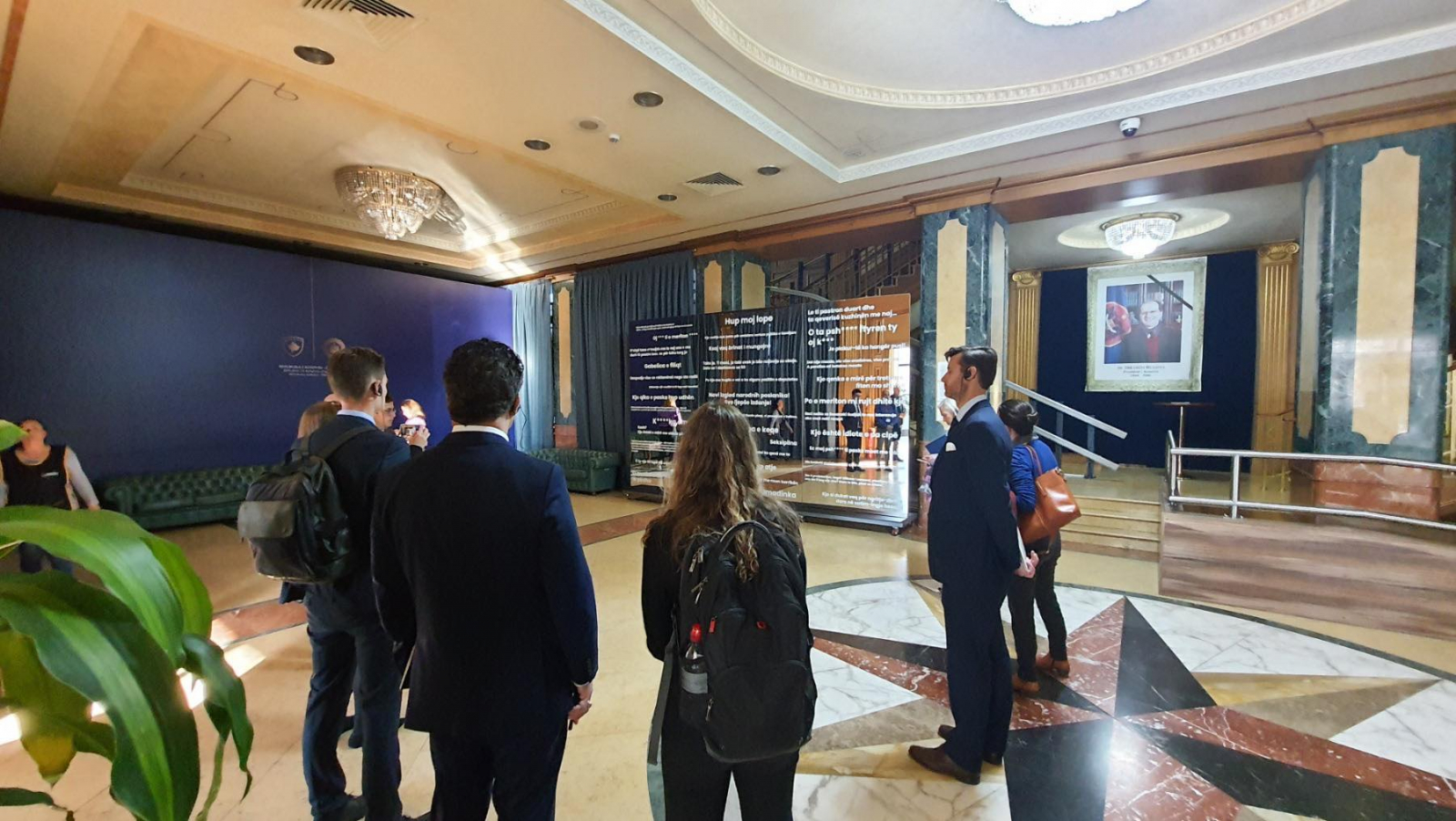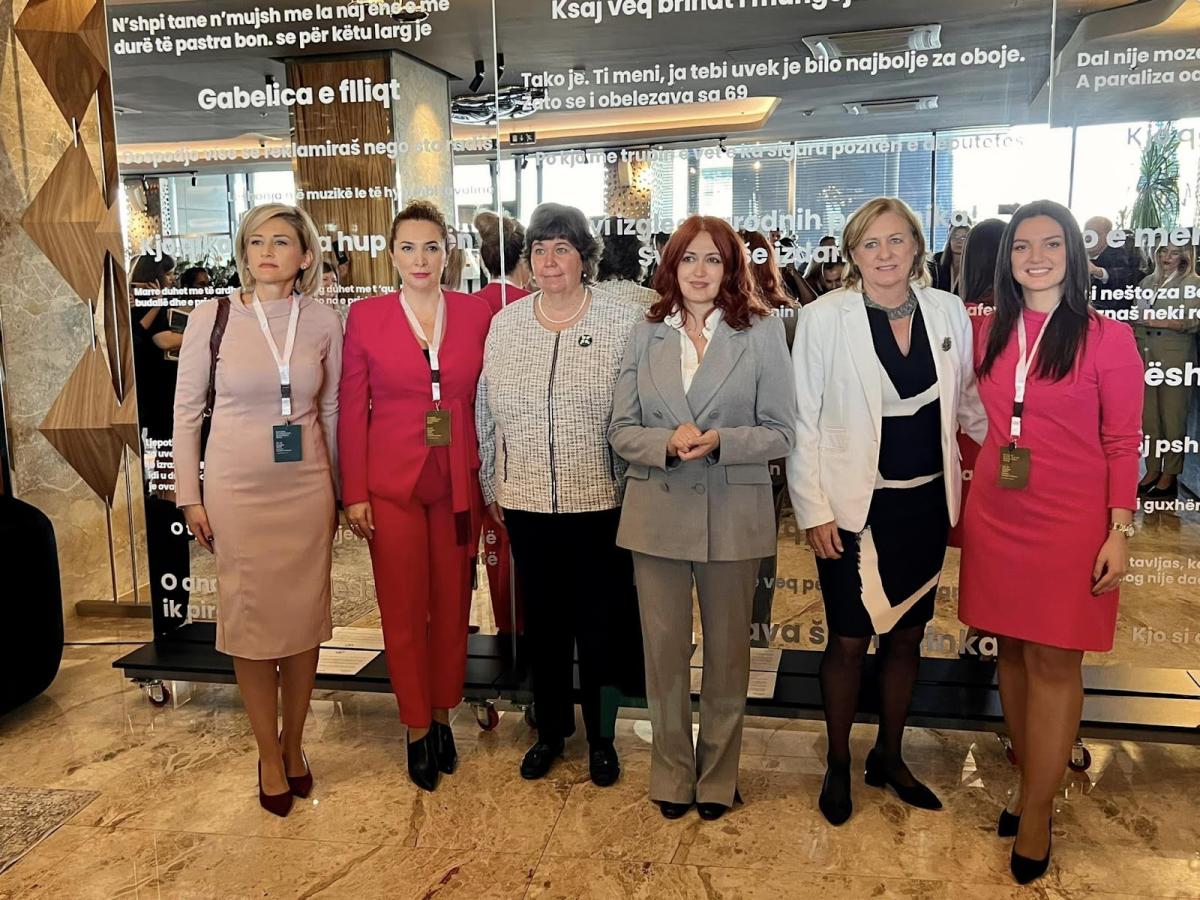
SHARE
“We recognize now that violence against women in politics is not only a threat to women, but also a threat to democracy.”
Madeleine K. Albright
The rise of the digital technology era has undeniably reshaped democracies around the world. Digital transformations have reinvigorated democracies, enhancing their accountability and responsiveness. Digitalization has also created new risks and anti-democratic forces, one of which is online violence, in particular violence against women.
In response to the rising tide of violence against women in politics (VAW-P) in Kosovo, Eliza Hoxha, a woman MP who serves on the board of Kosovo's women’s caucus, conceptualized an art installation. Designed for the Assembly of Kosovo’s premises, the installation displayed a selection of sexist, misogynistic, insulting, and threatening comments and messages addressed to women members of parliament in Kosovo. Its shocking content makes plain a problem that is so often brushed aside as simply the “cost” of doing politics.
Online violence presents democratic and national security challenges, affecting society as a whole by silencing, censoring and diminishing women’s role. Online VAW-P has created space for pervasive hate speech, harassment, and misogynistic and sexist language used against politically active women. NDI’s research has found that such violence has a chilling effect on women’s political participation.
Dealing with such abuse and harassment on a daily basis further deepens the challenges of women in politics, causing them (and their loved ones) ongoing harm, while also detracting from their political priorities and agendas. Moreover, violence against women in Kosovo by political leaders and the media has increased significantly during the Covid-19 pandemic. While women understand the perils and consequences, many continue their journey in politics. Men, too, must play active roles in becoming allies to call out and end any type of violence. NDI’s research continuously shows an increase in public awareness of this threat.
The Kosovo women’s caucus shared screenshots of the harmful things sent to them, and one of its members designed the piece. The caucus leadership unveiled the mirrored work during the Women Peace and Security Forum hosted by Kosovo President Vjosa Osmani Sadriu. The work used actual quotes from comments on the posts of the women MPs on their social networks and on news portals that showcase the work of women MPs, as well NDI and partner reports on harmful content in Kosovo’s media space. The installation now resides in the premises of the Assembly of Kosovo, serving as a daily reminder to policymakers and the public of the importance of addressing this issue and taking steps to end it.
It has already sparked heated conversations on the issue. MPs in a plenary session reacted: with one woman MP encouraging her colleagues to stop and look at the messages contained—which she cited as halting women’s voices. Another asked the government to adopt a new mindset for the role of women and girls in society. The Minister of Justice referenced the wall in calling for a halt on VAW-P and violence against women and girls of all forms and referenced it in her discussion of a proposed article in the penal code to ensure sanctions for such violence. As Nancy Soderberg, the NDI Kosovo Country Director, put it, "Violence against women in politics threatens democracy by deterring half the population from participating in politics. The Wall of Shame forces citizens and representatives to confront directly what women in politics face every day. This raising of awareness will help propel legislators to take stronger action. "
NDI provided support for the “Wall of Shame” installation as an extension of its annual Week of Women, with the support of the United States Agency for International Development and the Embassy of Canada in Croatia and Kosovo. The Wall is part of NDI’s continuing efforts to create a safer environment for women engaged in politics and to mark #16daysofactivism against VAW. NDI is committed to raising awareness and ending online violence against women in politics (OVAW-P), which NDI research shows is a key driver of the withdrawal from online political discourse and discourages other women from joining public and political life.
NDI calls on all relevant stakeholders to recognize and act on ending online violence against women in politics, which causes withdrawal from online political discourse and discourages other women to join public and political life.
“We need to unify our reactions in addressing violence in politics targeting women and their appearance. Unfortunately, I have encountered that reactions towards this phenomenon are selective. VAW-P should be addressed as an issue no matter what political party or entity we represent.”
Female Member of Parliament, Assembly of the Republic of Kosovo
“ Engaging male allies in efforts to empower women in decision-making roles is a crucial step towards achieving gender equality. Both men and women Members of Parliament should work together beyond party affiliations and ideologies to uproot gender stereotypes in unleashing the full potential of women as politicians - which benefit society as a whole.”
Male Member of Parliament, Assembly of the Republic of Kosovo
Author: Nita Bicurri, Elizabeth Saam, and Argjenta Svirca
NDI implemented this activity through its program from the United States Agency for International Development (USAID).
Picture 1: From left to right: Mimoza Kusari-Lila, Member of the Parliament, Assembly of the Republic of Kosovo; Albena Reshitaj, Member of the Parliament, Assembly of the Republic of Kosovo; Anita Vandenbeld, Parliamentary Secretary to the Minister of International Development of Canada; Eliza Hoxha, Member of the Parliament, Assembly of the Republic of Kosovo; Ambassador Nancy Soderberg, Senior Resident Country Director, NDI Kosovo; Jeta Statovci, Member of the Parliament, Assembly of the Republic of Kosovo





